That the film coincides with a pandemic which will kill the uninsured, sick and elderly is just another layer of discomfort
Jessa Crispin THE GUARDIAN Sun 15 Mar 2020
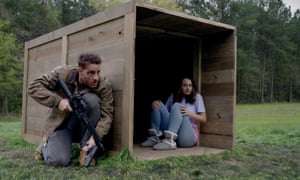
‘If you don’t find it funny to watch a woman impaled on spikes or a man blown up on a landmine, you must be one of those humorless cancel culture freaks who need to learn to take a joke.’ Photograph: Universal
My entertainment options this week were a movie in which “liberal elites” hunt down and murder “deplorables” for sport – deaths that are ultra gory and played for laughs – and a Hulu documentary in which Hillary Clinton explains with a chuckle and a smile why the policies supported by her 2016 opponent, Bernie Sanders – policies like universal healthcare and prison reform, which would help countless Americans – are just not “doable”. In other words, essentially the same thing.
The Hunt was supposed to be released last fall, but it was put on hold after some people wondered if a movie about political polarity and divisiveness in contemporary society, in which a bunch of poor people die violently was really going to be a good idea. Released now, the controversy is its main selling point. And – since we are in the beginning stages of a pandemic for which the United States is not remotely prepared and in which the uninsured, elderly, and poor are much more likely to die – well, let’s just say the timing creates a certain tone.
The co-writer and producer Damon Lindelof – who recently read the legendary anti-fascist comic Watchmen and thought, huh, okay, but what if instead we made the cops the heroes? – has created a world where a group of rich, NPR-listening liberals, who bicker about gendered language and whether “black” or “African-American” is the more acceptable term, drug, abduct, and murder Trump voters for sport. One of the Trump voters actually isn’t a Trump voter but is brought there by mistake, and not being a redneck hillbilly idiot, she manages to fight back. I think that’s a metaphor. For something.
Ultimately the film wants to pretend to be a commentary on cancel culture and our new culture wars. It turns out the whole plan for liberal elites to hunt deplorables becomes a reality because deplorables can’t take a joke about liberal elites hunting deplorables. The slapstick deaths are supposed to indicate that hey, we’re just playing around here, rather than show a callous disregard for human life on the part of the film-makers. And if you don’t find it funny to watch a woman impaled on spikes or a man blown up on a landmine or a woman choking to death after she’s poisoned, you must be one of those humorless cancel culture freaks who need to learn to take a joke.
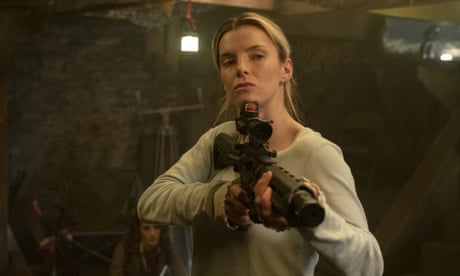
But of course if you’re from and of the coasts it’s easy to believe these new culture wars are just about a difference of opinion about gun control or abortion and not about the hopelessness and loss of meaning and instability causing the deaths of despair killing white middle Americans without college degrees through suicide and addiction. It’s similar to how one segment of the population will remember the culture wars of the 1990s as a discussion about whether a crucifix of Jesus Christ submerged in urine should be considered art, and not about whether the thousands of gay people, IV drug users, hemophiliacs, and others deemed ultimately disposable by the government and society should have been allowed to die from Aids. Or as a debate about whether children should be exposed to vulgarity in music, and not about whether black people or people in poor neighborhoods should be murdered, brutalized, and harassed by the police forces that claim to protect them.
It’s not clear that anyone involved with this film has ever even been to the south. The star, Betty Gilpin, plays a working-class woman named Crystal who spends the entirety of the film holding her jaw as if she is trying not to let any spit from the chewing tobacco dribble out, and yet at no time does she partake in chewing tobacco. It’s like she saw a picture of someone once and thought, Oh, that must be how they do it down there, but no one explained to her it’s not just that all southerners have a severe underbite. But then no one involved in the production thought it might be weird for the action of the film to play out in Croatia, a country still dealing with the aftermath of its own … uh, let’s call it political polarity and divisiveness, I guess.
I’m sure the millionaires who endorsed billionaire Mike Bloomberg in the Democratic primaries will watch this movie on their private jets and have a good chuckle at the depiction of clueless and out-of-touch elites heading to Croatia on their private plane with a cargo full of white trash. “Oh my God, that’s so us! I also enjoy a little caviar snack while on my way to my private manor in the Balkans.” And then they’ll go back to deciding which underprivileged group should receive their charity this month – instead of just paying their taxes, which could fund an adequate public healthcare system that would keep people from having to beg online to afford chemotherapy.
Cinemas across the US are currently closing because of coronavirus; perhaps only the elites who can afford private screenings of The Hunt in their palatial estates will be able to see it. In the meantime, the rest of us are about to go on quarantine lockdown, forced to sustain ourselves on whatever mediocre bilge Netflix has put out this week. I think that’s a metaphor. For something.
Jessa Crispin is the host of the Public Intellectual podcast. She is a Guardian US columnist
'It's a fun movie, I promise': behind the elites v 'deplorables' thriller The Hunt
The director of the controversial film about liberals hunting Trump voters talks intention, assumptions and how it feels when the president tweets about you
Benjamin Lee Thu 12 Mar 2020
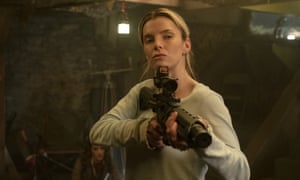
Betty Gilpin in The Hunt. Photograph: Patti Perret/AP
“Icertainly didn’t make the movie to try and gin up controversy,” said Craig Zobel, director of the most controversial movie of not only this year but last year as well, a potato so hot that it was briefly deemed untouchable. The Hunt, a schlocky thriller that also happens to be a broad satire on political extremism in the US, was originally scheduled for release last September, but after the Dayton and El Paso shootings the month before, it faced an uncertain future.
The plot imagines a Hunger Games-style playground where liberal elites hunt “deplorables”, AKA Trump voters, in a variety of gruesome ways. Initially, the film’s marketing campaign were paused out of respect (even a satirical use of such heavy artillery was not deemed appropriate at the time) but matters worsened when details about the film’s red state v blue state setup started to disseminate and rightwing anger travelled all the way from Fox News to the White House. Trump didn’t name the movie specifically but in a tweet on 9 August, he called Hollywood “racist”, “really terrible” and said some of the films being released are “very dangerous for this country”. On 10 August, The Hunt was taken off the schedule.
For a time, there were questions over whether we would ever get to see The Hunt, at least on a big screen, with rumours that Universal might consider selling it to an online streamer. But with a tweaked marketing campaign, one that now revels in its toxic infamy, it re-emerged earlier this year and now, finally, it’s being unleashed on the public.
“It’s been a long road,” Zobel said to me on the phone from Los Angeles, sounding understandably wearied. “You make a movie hoping that people get to see it and now people finally do and I think I’m just excited to hear people’s responses.”
The Hunt began with Lost co-creator Damon Lindelof and his Leftovers co-writer Nick Cuse crafting a devilish way to update Richard Connell’s 1924 short story The Most Dangerous Game, centred on a brutal human hunt, for an increasingly fractured America. Zobel, whose big-screen credits had included grim fact-based fast-food drama Compliance and post-apocalyptic saga Z for Zachariah, had also directed a number of episodes of The Leftovers and was immediately drawn to the idea.
He had just moved from the liberal safe haven of New York City to Athens, a smaller city in Georgia, a state that voted for Trump in 2016. “I realised I was making assumptions about these people that lived around me,” he said. It led him to crave something that would both explore and poke fun at the ideas that we have of those on the opposing side so it was kismet when the script came his way. “We found out that we had all been individually thinking about this stuff and that it was the perfect time for us to tell this story,” he said.
For a while, the stars seemed to align. Blumhouse, the hit-making company behind Get Out and Paranormal Activity, jumped onboard, as did Universal and a cast including two-time Oscar winner Hilary Swank, Glow breakout Betty Gilpin and Ryan Murphy. Emma Roberts quickly signed on. But then things went sour and a Friday night B-movie suddenly became the subject of noxious debate, referred to as “demented”, “evil” and “dangerous”. Before anyone had even seen it.
“Icertainly didn’t make the movie to try and gin up controversy,” said Craig Zobel, director of the most controversial movie of not only this year but last year as well, a potato so hot that it was briefly deemed untouchable. The Hunt, a schlocky thriller that also happens to be a broad satire on political extremism in the US, was originally scheduled for release last September, but after the Dayton and El Paso shootings the month before, it faced an uncertain future.
The plot imagines a Hunger Games-style playground where liberal elites hunt “deplorables”, AKA Trump voters, in a variety of gruesome ways. Initially, the film’s marketing campaign were paused out of respect (even a satirical use of such heavy artillery was not deemed appropriate at the time) but matters worsened when details about the film’s red state v blue state setup started to disseminate and rightwing anger travelled all the way from Fox News to the White House. Trump didn’t name the movie specifically but in a tweet on 9 August, he called Hollywood “racist”, “really terrible” and said some of the films being released are “very dangerous for this country”. On 10 August, The Hunt was taken off the schedule.
For a time, there were questions over whether we would ever get to see The Hunt, at least on a big screen, with rumours that Universal might consider selling it to an online streamer. But with a tweaked marketing campaign, one that now revels in its toxic infamy, it re-emerged earlier this year and now, finally, it’s being unleashed on the public.
“It’s been a long road,” Zobel said to me on the phone from Los Angeles, sounding understandably wearied. “You make a movie hoping that people get to see it and now people finally do and I think I’m just excited to hear people’s responses.”
The Hunt began with Lost co-creator Damon Lindelof and his Leftovers co-writer Nick Cuse crafting a devilish way to update Richard Connell’s 1924 short story The Most Dangerous Game, centred on a brutal human hunt, for an increasingly fractured America. Zobel, whose big-screen credits had included grim fact-based fast-food drama Compliance and post-apocalyptic saga Z for Zachariah, had also directed a number of episodes of The Leftovers and was immediately drawn to the idea.
He had just moved from the liberal safe haven of New York City to Athens, a smaller city in Georgia, a state that voted for Trump in 2016. “I realised I was making assumptions about these people that lived around me,” he said. It led him to crave something that would both explore and poke fun at the ideas that we have of those on the opposing side so it was kismet when the script came his way. “We found out that we had all been individually thinking about this stuff and that it was the perfect time for us to tell this story,” he said.
For a while, the stars seemed to align. Blumhouse, the hit-making company behind Get Out and Paranormal Activity, jumped onboard, as did Universal and a cast including two-time Oscar winner Hilary Swank, Glow breakout Betty Gilpin and Ryan Murphy. Emma Roberts quickly signed on. But then things went sour and a Friday night B-movie suddenly became the subject of noxious debate, referred to as “demented”, “evil” and “dangerous”. Before anyone had even seen it.
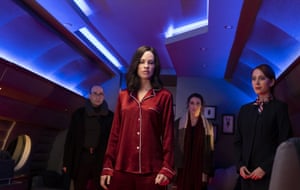
Hilary Swank in The Hunt. Photograph: Patti Perret/AP
“It felt bizarre because the film was supposed to be an absurd satire and was not supposed to be serious and boring and I felt that the conversation immediately got serious and boring,” Zobel said. “I was just the person, over in the corner, maintaining ‘It’s a fun movie, I promise! I just want people to see it!’ because it’s a film that’s essentially about the assumptions you make about something without really knowing anything about it.”
Making an assumption about something without really knowing anything about it has become a signature move for the US president although nothing could have prepared Zobel for the surreal moment of seeing your film tweet-dragged by one of the most powerful men in the world.
“I was in the very last days of sound mixing the movie,” Zobel recalled. “I got a text from Ike Barinholtz, one of the actors [in The Hunt], who said I think that the president of the United States just tweeted about our movie. I had to go looking for what he was talking about and pretty quickly just ended up standing outside the soundstage for the rest of the day trying to process and kind of parse what was going on and it was unique. The day that the president tweets something about you or a movie that you made is just a very weird day, it really is.”
The ire aimed at Zobel, death threats included, was predicated on the idea that the film was somehow celebrating the leftists who take bloody revenge on rednecks but, if anything, it works hard at doing the opposite. Zobel sees it as a “fun refuge” rather than an angry dissection of where we are right now. The difficult journey it’s had to reach an audience has found its happy ending with a wide release but it also serves as a warning of how easily film-makers can get silenced in a culture keen to cancel.
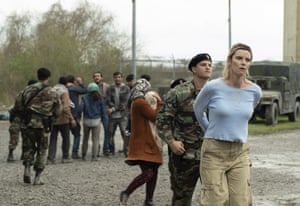
Betty Gilpin in The Hunt. Photograph: Patti Perret/AP
“It isn’t a healthy world, one where everyone is trying to decide whether or not they should make something based on how it’ll be received politically,” Zobel said. “I certainly wouldn’t advocate for that and I don’t think like that, even after this. “I believe that people who have things to say will continue to really have things to say.”
We spoke a week before the reviews came out, which were mixed at best (the Guardian’s Adrian Horton called it “a boilerplate B-movie that doesn’t say nearly as much as it thinks it does”), telling a cautionary tale of the dangers of hype. The film that Zobel saw as “playful and fun” had mutated into something with far more to carry on its shoulders. Ultimately, what The Hunt works best as is an action thriller which I told him would please at least one potential audience member, notorious for skipping past dialogue to watch the explosions.
“I think the president might like the movie,” Zobel agreed. “I’m proud of the action scenes in the movie. If he wants to just watch the action scenes, I’m fine with that!”
The Hunt is out now
No comments:
Post a Comment